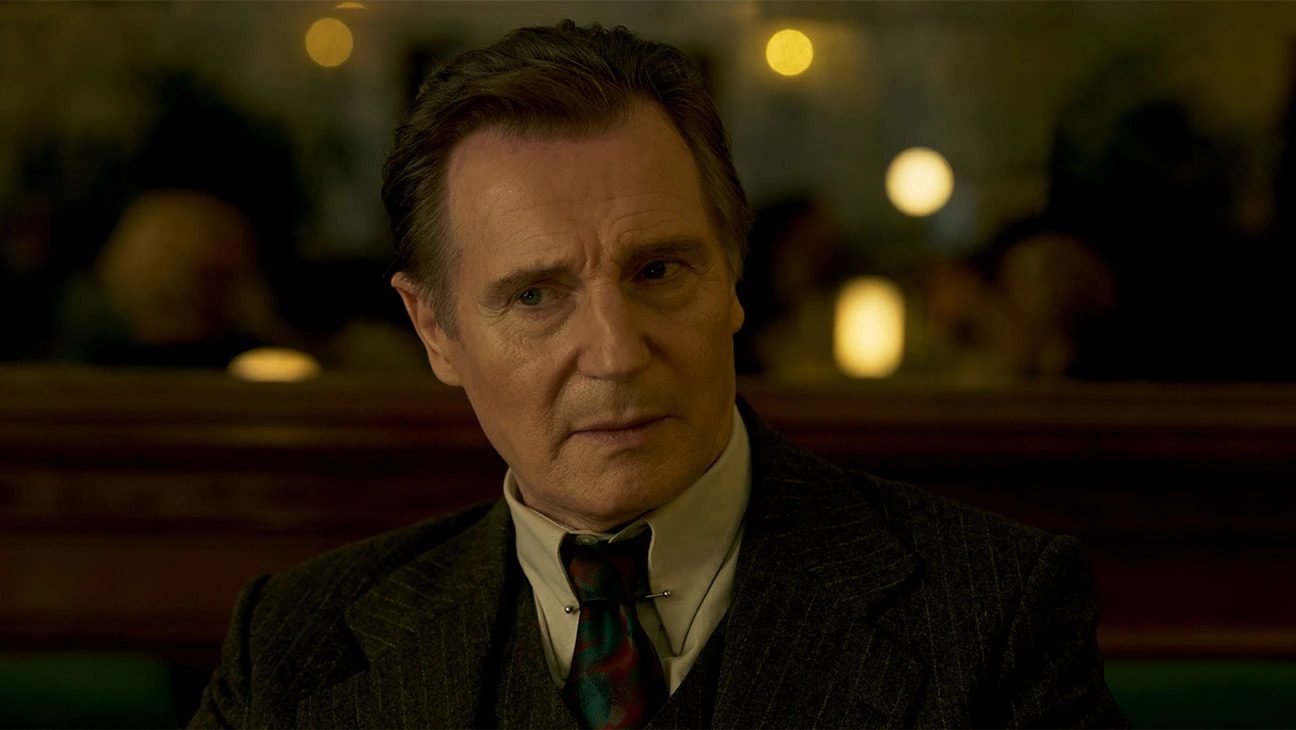REVIEW: Marlowe (2023)
To call Marlowe a wannabe noir film would be to ascribe to it aspirations it doesn’t have. Marlowe isn’t trying to capture a time and place, evoke a particular tone or feel, replicate a form of dialogue, or even basic things like engage you in a mystery or surround you with compelling characters. Marlowe simply wants to be good enough – good enough to pass for the genre in which it’s disguised, good enough to make you think you’ve watched a decent detective story with one of the most famous literary gumshoes of all time. And it isn’t.
As the 1930s wind down, private eye Philip Marlowe (Liam Neeson) is hired by movie star scion Clare Cavendish (Diane Kruger) to find her missing lover (François Arnaud). The case looks open and shut, but as Marlowe digs deeper, he has to contend with Floyd Hanson (Danny Huston), the crooked owner of a private club for the wealthy, Lou Hendricks (Alan Cumming), an importer with an armed and dangerous chauffer (Adewale Akinnuoye-Agbaje), and Clare’s mother, Dorothy Quincannon (Jessica Lange), a former Hollywood leading lady. Adding to his troubles is Clare’s fleeting relationship with the truth.
Marlowe pretends to have one of those twisting noir plots that go in several different directions, involving multiple people who don’t seem to be connected until their relationship to the detective’s case is revealed. And it does, I suppose, except it doesn’t play by the rules. There are no clues as to what’s really going on, aside from the general “nothing is as it seems” trope we all know going into every movie like this. The ultimate solution to the mystery, the secret behind everyone’s interest in the missing lover, is never suggested by any evidence in the story, and it seems to come out of nowhere when Marlowe finally puts it together. This is careless plotting, stringing the viewer along until the credits roll rather than getting him to participate in the game.
Part of the reason why is that Marlowe fails spectacularly in exploring the world it inhabits. The mystery involves Hollywood – the missing man is a movie prop master – but outside of the occasional reference, there’s nothing to make you feel like you’re entering Hollywood of yesteryear. (And some of those are bad; at one point, Marlowe references a movie that won’t be made for over forty years.) Marlowe never visits a film set or snoops around a studio, which you’d think would help him; as it happens, this would have been the perfect place to set up the secret behind the disappearance. Instead, time is wasted having Marlowe investigate an exclusive club, Clare and her husband’s mansion, run-down apartments, and various other settings that are fine on their own but take up too much space in a film that needs to stretch a bit more.

Paradoxically, for a movie that needs more time spent elsewhere, Marlowe is another rushed affair, something a great many films and TV shows have been guilty of recently. The editing is some of the worst I’ve seen, with scenes being cut short and Marlowe magically transported somewhere else with a new character. For example, one early scene finds Marlowe being jumped by a trio of gardeners as he tries to find a way into a club that won’t let him in the front gate. When they all pick up weapons, Marlowe knocks one of them down… and then the movie cuts to a roadside somewhere else, where Marlowe is talking to a friend on the police force. How did he get out of his predicament? Did he find a way into the club? Nobody making Marlowe seems to have cared. There are more instances of this, with scenes just stopping before they’re finished so the movie can get on with itself. Perhaps this is to quicken the pace, but it doesn’t work because it just fast-forwards through the plot.
A better way to do that would have been to cut some of the characters. Marlowe is littered with superfluous people, trying to recreate the feel of a noir story (or, again, trying to look like it is) but only succeeding in muddying up the already confusing plot. You know that cop friend I mentioned a moment ago? He’s one of two buddies Marlowe has on the force. Why does Marlowe need two of them in one story to perform the same function? There’s also a pair of bad guys who disappear from the film after doing something pretty heinous – something we’d like to see Marlowe pay them back for doing. It’s a big plot hole that’s simply never mentioned after a certain point. I’m still not sure what certain characters were up to with their contributions to the story. But you need a certain amount of players for it to feel authentic, so here they are.

And that’s the big problem: Marlowe doesn’t feel authentic. The big cast of characters, the twists, the pace, the locales, and the Hollywood connection are all here because this movie was made by people who think they’re supposed to be here. But the characters are either poorly defined or unnecessary, the twists come out of nowhere, the pace isn’t earned, the locales are window dressing (although from a design standpoint, some are quite good, especially the basement of the club, a hellish nightmare where problems are dealt with violently and permanently), and Hollywood is at arm’s length. The dialogue is much the same, emulating hard-boiled talk without the grace or poetry of the old noirs, resulting in lame exchanges and painful puns. These are movies of a different era, meaning to make one in 2023, you’ve got to love the genre, and I don’t think Neil Jordan or William Monahan do. (Although they’ve both made excellent crime films in the past; Jordan directed Mona Lisa and The Good Thief, while Monahan wrote The Departed and Edge of Darkness.) These are excellent talents, but they’re the wrong fit for Marlowe.
I’m on the fence about whether the same is true of Liam Neeson. He doesn’t come off well as Marlowe, seeming apart from the world Raymond Chandler’s detective inhabits. You never think you’re watching Philip Marlowe, as opposed to Liam Neeson. But I’m not sure if that’s all Neeson’s fault, as the dialogue and plot let him down at every turn. On the other hand, some of the other actors fare better, with Jessica Lange, Colm Meaney, and Adewale Akinnuoye-Agbaje being particular standouts. Alan Cumming is great, too, although he’s not particularly noirish; he’s an outlandish character played with just the right note to make him believable, and Cumming looks like the only person on the screen who’s having any fun. Diane Kruger, unfortunately, seems lost at sea, too unsure of herself to be the dame with all the secrets, and she and Neeson have no chemistry. Danny Huston also looks bored, not sure how to deliver his weak dialogue. And this is why I ultimately give Neeson, and even Kruger, the benefit of the doubt, as Danny Huston should be at home in a film like this.
Marlowe should have been great, but it feels like the kind of femme fatale it’s too inept to feature – a beautiful façade hiding an ugly heart.
Marlowe (2023)
Plot - 5
Acting - 6
Directing/Editing - 5
Music/Sound - 6
Mystery - 4
5.2
Bad
Marlowe is half-baked rather than hard-boiled, a poorly plotted noir imitation that fails to evoke its genre. The dialogue, the main performances, the tone, and the setting are inauthentic pretenders rather than recreations of a different time. A few of the actors hit the right note, and some of the locations are solid, but the movie never comes together.
Comments (2)

I read the first two Chandler books, The Big Sleep and Farewell My Lovely, and I feel the same way. I’ve read a few others as well, like The Maltese Falcon and The Thin Man by Dashiell Hammett, and Double Indemnity by James M. Cain, and had a similar reaction to them. But I do like some more modern ones, like Dennis Lehane’s series about Patrick Kenzie. And Ira Levine wrote a great one called A Kiss Before Dying.
I’d like to watch some more of the movie adaptations of Chandler’s books, though; I have a suspicion it may work better on film for me. I saw Marlowe at an Alamo Drafthouse, and they played trailers from other Chandler films, and they looked great.








Seeing this a lot lately. Failed Noir attempts. Raymond Chandler is a a legend, but I have yet to really get into his writing. It never clicked for me. Same with John D. MacDonald. Maybe one day.